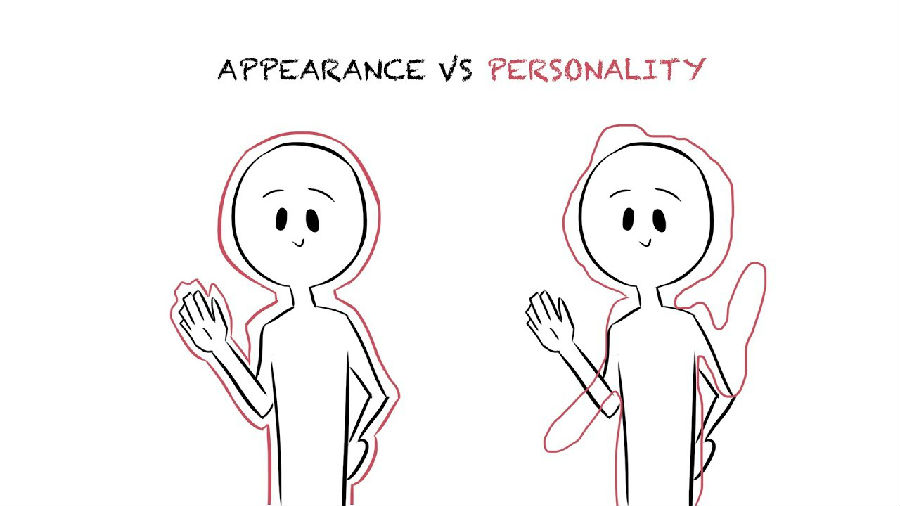(单词翻译:单击)
Today we're going to talk about self-presentation. Self presentation is how we perceive ourselves whether that be in front of others or when we're alone.
今天我们要说说自我表现。自我表现是指我们在别人面前或是独处时是如何认知自己的。
The fascinating thing about people is how different our self-presentation can be.
人类最吸引人的一点是我们的自我表现是如此的不同。
How we behave when we are alone can contrast to how we behave around others. Why do we behave differently?
独处时的表现和在别人面前的表现形成对比。我们为什么会表现的不同呢?
It's partially due to something called the comfort zone.
部分原因是因为舒适区。
While you might make your own decisions about what comfort zone means to you,
或许大家对舒适区的定义各有不同,
generally our comfort zone is the state where we feel as though we can do whatever we want, while not being criticized or dealing with anxiety.
但通常我们的舒适区是我们做任何事都不会被批评或惹人生气的一种感觉状态。
It can be divided into a zone of privacy or a zone of familiarity.
舒适区分为隐私区域或亲密区域。
In the zone of privacy, we feel alone and secure with no one to judge us or watch us.
在隐私区,没人对我们评头论足,所以我们感到安全和孤单。
In the zone of familiarity, we feel secure and have a sense of comfort and trust with the people around us.
在亲密区,我们和信赖的人待在一起,感到安全和舒适。
In this zone, you don't necessarily feel shame or guilt if you do socially unacceptable things.
在这个区域,就算做了社会所不能接受的事也不必感到羞愧和内疚。
Often, this zone is full of your friends and family who have come to accept you for who you are.
这个区域里都是你的朋友和家人,他们无条件的接受你,
Feelings such as embarrassment, anxiety or shame come when you're, you guessed it, out of your comfort zone.
一旦走出这个舒适区,尴尬、焦虑或羞愧就会涌现。
These zones like to dictate how we present ourselves. Knowing which zone you're in is very important when it comes to physical interactions with another person.
这些区域喜欢命令我们如何表现自己。当你在与人有动力性配合动作时,了解你在哪个区域非常重要。
People are concerned with the impression they give to others.
人们关心自己留给他人的印象。
For example, even if a couple were to fight all the time in the private zone of their own home, they will most likely not do that in public.
例如,即使一对总是在家庭隐私区吵架的夫妻,他们也不会在公众场合吵架。
This way it does not draw unwanted attention to them and it gives a more positive impression. This is a form of self-presentation.
这样就不会引起不必要的注意,也能给别人留下积极印象。这是自我表现的一种形式。
Self-presentation is a set of methods and strategies we use selectively to apply in situations to shape and enhance or change our self-image to others.
自我表现是我们在不同场合用于塑造、提升或改变自我形象的选择性使用策略和方法。
This can be conscious or unconscious, sometimes your personality can be accurate but sometimes it can be misleading.
这可以是有意识的,也可以是无意识的,有时你所展现的个性是准确的,但有时也会是误导性的。
We typically have two goals in mind when it comes to figuring out how to act, dress and talk.
当涉及如何表现、穿着和交谈时,脑袋中常出现两个目标。
Strategic self-presentation and self-verification.
策略性自我表现和自我确认。
Strategic self-presentation is when you will manipulate how you perceive yourself to different people.
策略性自我表现是指你将操控自己在面对不同人时候的感知。
Many people use this in order to gain sympathy or even approval from others.
许多人都利用这一点获取同情或者甚至得到别人的认可。

Edward E. Jones coined the term ingratiation, which means we behave a certain way to be liked or to satisfy target audience
爱德华·埃尔斯沃思·琼斯创造出一个术语,逢迎,指我们为了得到别人的喜欢或为了满足目标观众而以某种行为表现
just so that we are able to get praised for actions later on.
这样我们就能得到赞扬。
Another self-presentation behavior most people do is self promotion.
另一种常有的自我表现行为是自我推销。
This means that you will boost your awards of your positive traits and disregard your failures and negatives.
这意味着你要宣扬自己的积极品格而忽视错误和负面品格。
This is a common way people use self-presentation to their benefit in the job market.
人们常将这种自我表现的方法用在工作上的获益。
However, self-presentation can't be too in-your-face.
然而,自我表现不要过于外露。
When people want to be liked they will talk highly about themselves
当人们想要被喜欢时,他们会抬高自己,
but if no one is acknowledging them, then that person might resort to degrading others.
但如果没人认同他们,这个人或许会靠贬低被人来抬高自己。
Self-presentation needs to have a tactic to keep it subtle, or else people will think you are arrogant and self-absorbed.
自我表现需要策略维系它的敏感度,否则别人会认为你很自傲和自私。
Self-verification is a little different. This means that we want people to perceive us how we perceive others.
自我确认稍有不同。这意味着我们想让别人感知我们是如何感知别人的。
Psychologist William Swann says that we are passionate to prove to others how we behave.
心理学家威廉·斯旺表示我们乐于向别人证明我们如何表现。
If society labels us one thing and we believe in, that proves to be an accurate description of our personality.
如果社会给我们贴上标签,我们也认可,这证明这个标签是对我们性格的准确表述。
But if society labels us as something negative or something that we might not think is true about our personality, we will go far lengths to prove it wrong.
但如果社会给我们贴上负面标签或我们觉得这并不是自己真实的性格,那么我们将不懈的证明这个标签是错误的。
Most people do not want to know or learn about their flaws, they would rather reflect and learn from their positive ones.
多数人都不想知道或了解自己的缺点,他们更愿意反应和了解自己的积极特性。
Even though we want to leave a good impression, we also want an accurate representation of our behavior and personality.
我们想要留下好的印象,但我们也想要关于自己行为和性格的准确呈现。
There's nothing worse than being told we're something we're not and
没有什么比被人告知自己什么也不是更糟糕的了,
there's nothing better than having people know us for who we really are.
也没有什么比让大家了解一个真实的我们更好的了。
This is why we like to cherish those in our comfort zone, we don't need to worry about self-presentation or self-verification.
这就是我们珍视舒适区朋友家人的原因,我们不需要担心自我表现或自我确认。
Make sure you like this video and subscribe to our channel. Thank you for watching Psych2Go.
喜欢本期视频么,请订阅我们的频道。感谢收看。


